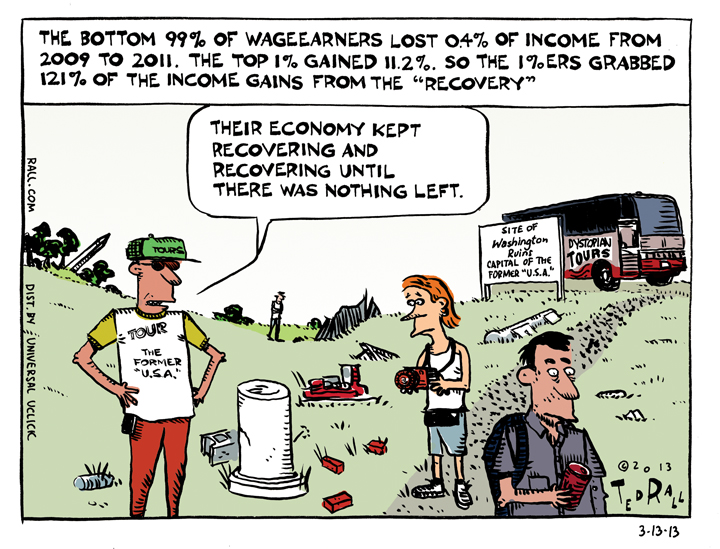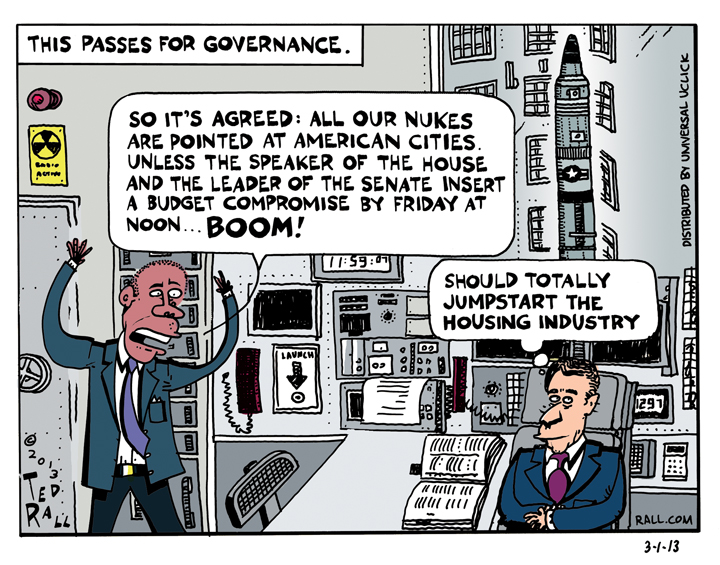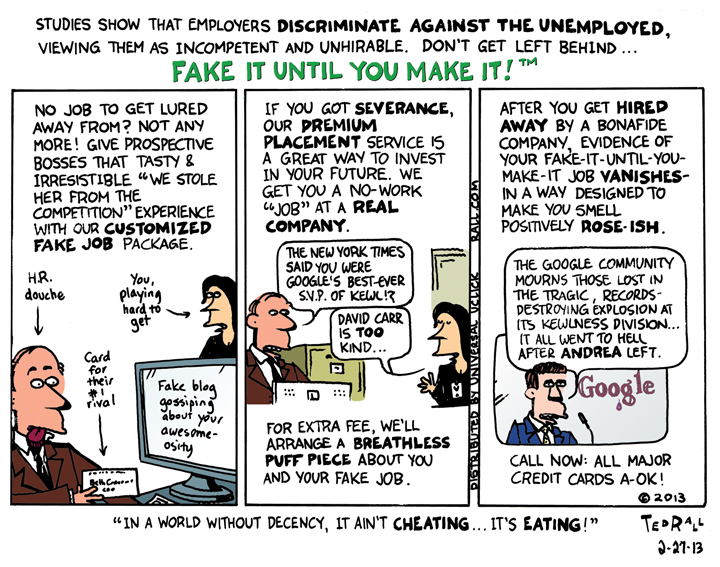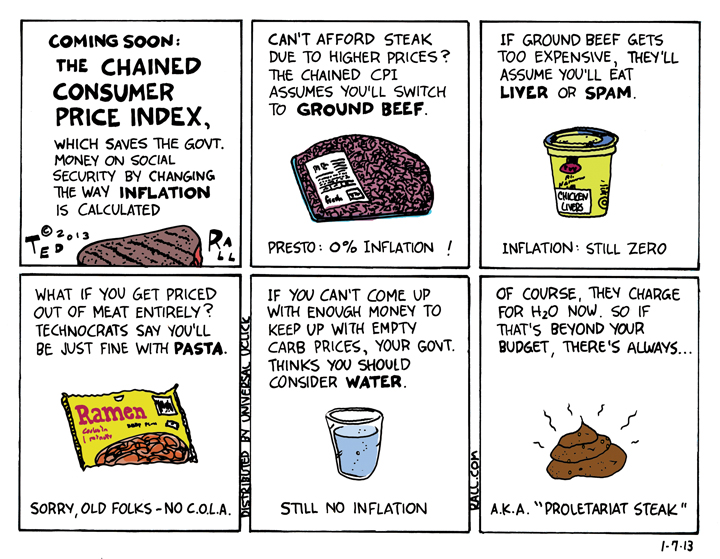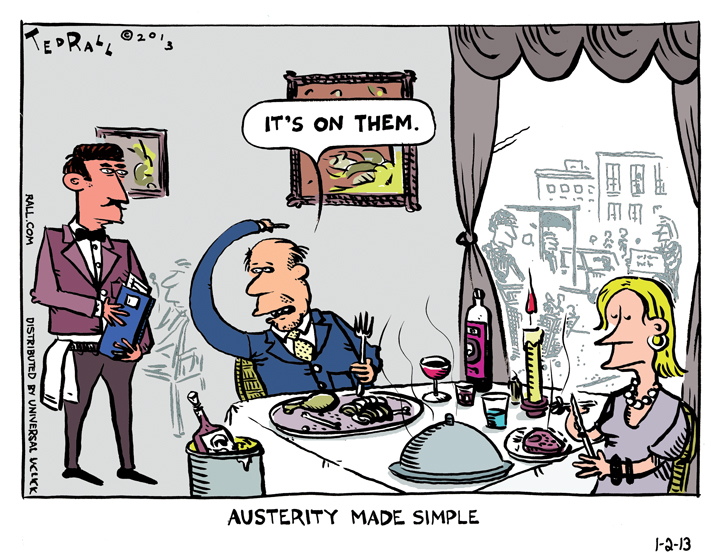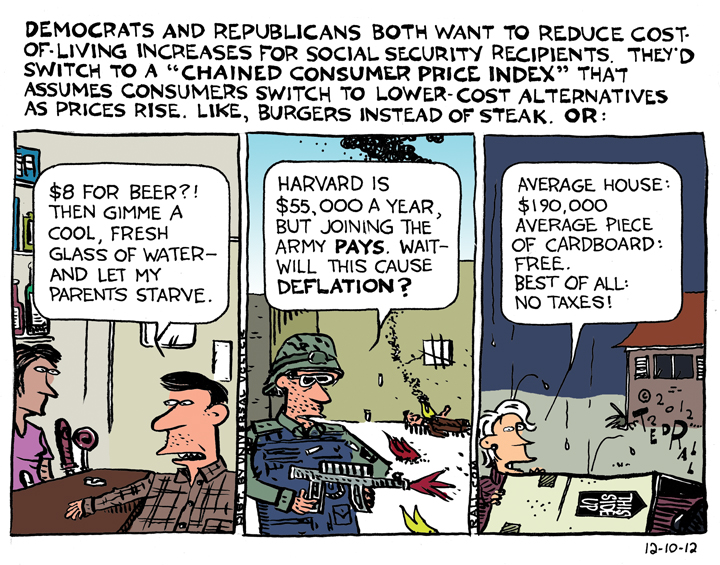The bottom 99% of wage earners in the United States lost 0.4% of their income between 2009 and 2011. The top 1% gained 11.2%. So the one percent grabbed 121% of the income gains from the so-called recovery. Can America afford much more recovery like this?
SYNDICATED COLUMN: Against Philanthropy
As Hurricane Victims Freeze, Billionaire Mayor Gives Away $1 Billion to Wealthy Med School
New York City Mayor Michael Bloomberg made headlines over the weekend with his announcement that he has donated $345 million to Johns Hopkins University. Added to his previous donations, the media baron has given his alma mater over $1 billion – the largest charitable contribution to an educational institution in US history.
Bloomberg received plaudits for his generosity by the usual media sycophants. Along with death and taxes, another thing you can count on is being told to be grateful when masters of the universe give away some of their loot (even if none of it goes to you.) As pundits fawned, thousands of New Yorkers – residents of Queens whose homes got damaged by superstorm Sandy – were shivering under blankets in heatless homes in 15° weather because restoring electricity and housing storm victims isn’t one of the mayor’s top priorities.
Disgusting.
This was a man, New Yorkers remember, who wanted the mayoralty so badly that he subverted the people’s will, bribing and bullying the City Council into overturning term limits passed by an overwhelming majority so that he could keep the job a third term.
No one should claim that he didn’t want responsibility for those poor cold slobs out in the Rockaways.
If there’s anything more nauseating than watching this rich pig bask in the glow of his philanthropy while the citizens he is tasked with caring for turn into popsicles, it’s the failure of anyone in the system – columnists, local TV anchor people, even Bloomberg’s political rivals – to call him out. For $345 million the mayor could have put his city’s storm victims up at the Four Seasons for years.
Bloomberg’s donation to one of the wealthiest universities on earth, with an endowment of $2.6 billion, serves to remind us that philanthropy is evil.
You could argue that generous rich people are better than cheap rich people. And if you like the way things are, with the gap between rich and poor at record levels and spreading – you’d be right. But most people are not happy with our winner-take-all economy.
No one deserves to be rich. And no one should be poor. Everyone who contributes to society, everyone who works to the best of their skills and abilities, deserves to earn the same salary. Of course, I realize that not everyone adheres to such basic Christian – er, communist – principles. (Anyone who denies that Jesus was a commie never cracked open a Bible.)
But most people – certainly most Americans – agree there’s a line. That too much is too much. People like Michael Bloomberg and Steve Jobs and Bill Gates may have worked hard and created products that consumers purchased in great numbers – but no one can work $25 billion hard (Bloomberg’s estimated net worth). There aren’t that many hours in the day; the human skull doesn’t contain enough synapses; no idea is worth that much.
One of the big problems with charitable giving is that it mitigates the injustice of inequality: sure, maybe it’s a little crazy that Bloomberg has 11 luxurious homes while people are starving to death and sleeping outside, but at least he’s generous. He’s giving it away. The implication, that the chasm between rich and poor isn’t that bad, is a lie. It’s also evil: If inequality isn’t that bad, it’s not important to talk about – much less fix.
“For many people, the generosity of these individuals who made so much money eliminates the problem that wealth poses, inequality poses, in the society,” says Robert Dalzell, author of “The Good Rich and What They Cost Us.” “We tend to conclude that such behavior is typical of the wealthy, and in fact it’s not…This whole notion of ‘the good rich’ I think reconciles us to levels of inequality in the society that in terms of our democratic ideology would otherwise be unacceptable.”
It’s better for society when rich people are unlikeable jerks like Mitt Romney. Knock over old ladies, stiff the waitress, talk with a pretentious fake British 19th-century accent, install a car elevator. Bad behavior by our elite oppressors hastens the revolution.
Bloomberg’s billion-dollar gift to a school that doesn’t need a penny illustrates the inherent absurdity of capitalism: aggregating so much wealth and power in the hands of a few individuals. It’s obscene and morally reprehensible to allow a disproportional share of resources to fall under the control of the arbitrary whims of a few quirky rich dudes.
Why should National Public Radio, which received a $200 million bequest by the widow of McDonald’s founder Ray Kroc, get all that cash while the Pacifica radio network – more avant-garde, better politics – teeters on the edge of bankruptcy? It’s nice that the Bill and Melinda Gates foundation fights AIDS in Africa, but who are Bill and Melinda Gates to decide that AIDS in Africa is worse than, say, diarrhea, which kills more people? It’s amusing to hear that the heir to a pharmaceutical fortune gave $100 million to an obscure poetry journal – but again, people are sleeping outside. Why not musicians? Or cartoonists?
People are dying because they can’t afford treatment by a doctor. People have been convicted of crimes they didn’t commit and executed because they couldn’t afford a competent lawyer to defend them.
If a government agency were allocating public funds based on the personal whims of its director, there would be a scandal. Under the veil of “philanthropy” billions of dollars that could help millions of people are being spent in a haphazard manner – and we’re supposed to applaud because it’s up to the “private sector”?
In an ideal world no one would have that kind of power. We’d be as equal as the Declaration of Independence declares us to be. We’d make decisions about who to help and what problems to try to fix collectively. The most unfortunate people and the worst problems would get helped first –long before Johns Hopkins.
Our world isn’t perfect. But it is our duty to do everything in our power to make that way. Toward that end, billionaires like Michael Bloomberg ought to have their assets confiscated and redistributed, whether through revolutionary political change or – for the time being – high taxes.
If we can’t pull off nationalization or truly progressive taxation, if we are too weak, too disorganized and too apathetic to form the political movements that will liberate us, the least we should do is to denounce “generous” acts of philanthropy like Michael Bloomberg’s for what they are: arbitrary and self-serving attempts to deflect us from hating the rich and the inequality they embody.
(Ted Rall’s website is tedrall.com. His book “After We Kill You, We Will Welcome You Back As Honored Guests: Unembedded in Afghanistan” will be released in November by Farrar, Straus & Giroux.)
COPYRIGHT 2013 TED RALL
SYNDICATED COLUMN: Weird Times
In Politics, It’s a Wild Wild Weird World
Hunter S. Thompson said: “When the going gets weird, the weird turn pro.” But what do you do when things go from weird to completely psychedelic?
The political landscape at the beginning of the second term of America’s first biracial president – in the usual historical sense, calling him black kind of requires an asterisk – is a messed up, topsy-turvy, bass-ackwards place.
There is the president’s newfound liberal rhetoric, even going so far as to namecheck gays and lesbians in his Inaugural Address. Did anyone tell him or members of the media that Stonewall was an actual riot, that endorsing this landmark of liberation is to endorse violent revolutionary change? He came off as something as a peacenik, implying that he would be willing to talk to, say, Iran. How does that square with his onslaught of drones, a campaign that increasingly looks like a grim Vietnam-style war of attrition?
But it’s his timing I can’t figure.
Back in 2009, when he came into the White House with an overwhelming mandate for radical change in the midst of the worst economic crisis since the Great Depression, when he enjoyed Democratic control of both houses of Congress, when the Republicans were so whipped that opinion writers for the Wall Street Journal wondered aloud whether there was a future for the GOP, he tacked right. Now that obstructionist Republicans control the House, ordinary citizens have settled into a grouchy state of permanent discontent amid downward mobility and shrinking expectations, when there’s absolutely no reason to expect to get anything big or bold accomplished, the dude is breaking out as some sort of crazy progressive?
Then there’s the bizarre realignment of the two major parties.
Leading Republicans, spooked by the election results, polls that show that the voters of the future are liberal on gays, abortion and other social issues, and possibly from finally having picked up dogeared copies of the prescient tome The Emerging Democratic Majority at Books-a-Million, are freaking out in the weirdest possible way. Something has to be done! But not if it requires compromising on our core values. Um, guys…white guys…old white guys…the problem is that the voters don’t like Republican core values. Or you personally. So what is to be done? Something!
You almost have to feel sorry for Republicans. Sure, they started a bunch of crazy wars that killed hundreds of thousands of innocent people, and they opened a string of concentration camps around the world, and they rolled back 800 years of cherished civil liberties that go back to the Magna Carta. But it’s sad to watch the mighty crash like a dictator’s statue pulled down by invading Marines. Not only is a sorta black man in the White House, all the GOP’s classic election-stealing tricks – corrupting the Supreme Court, bullying recount officials with paid thugs, moving voting booths out of minority neighborhoods – aren’t enough to close the growing gap between their obsolete stances and an increasingly left-leaning electorate. Now they’re so desperate that they’re even flirting with rejiggering the Electoral College, an institution that historically benefits Republicans, in order to suck out two or three more terms with them in control of the House – forget the Senate – before fading away into Whig-like oblivion as the Democrats retaliate.
Not to say that the Democrats are walking the straight and narrow road of sanity.
Americans of all political stripes say there’s one issue that consumes them most. One thing that they think about all the time. Something personal, something that affects everything else. Happily, it’s something that the government not only can do something about, but has been able to address many times in the past. I am talking about, obviously, the economy. Unemployment. Underemployment. The fact that there are no jobs. And that the jobs that are being created are all crappy. Or are in another country. Americans have been remarkably consistent about this. It would be hard to think of another time when people told pollsters for four years in a row that the same issue was the number one issue in the country. Whatever his other challenges, President Obama certainly doesn’t have to wonder about what’s on our minds.
So what is his second-term agenda? Given that his laissez-faire approach to the economic collapse throughout his first term basically involved golfing a lot while hoping that magical market forces would revive on their own, you might think that he would focus in like a laser-guided drone on the economy – you know, the number one most important issue to most Americans – this time around. But no, everyone’s telling us that Obama’s ambitious second-term agenda is – wait for it – gun control, immigration and climate change.
Don’t get me wrong: one of the great tragedies of the last dozen years was that Al Gore, one of the few American politicians who understands the gravity and imminent threat of global warming, didn’t get to exercise the presidential powers he earned at the ballot box. Though I will be shocked! shocked! shocked! if Obama’s proposals rise above the level of the usual too little/too late/too vested in corporate profits to curb industrialization, it’s nice to see the issue get lip service. Restoring sanity to America’s immigration system – can’t get in legally, so sneak in and hide out for 15 or 20 years until the next amnesty – is long overdue. Though, again, I wouldn’t be surprised if we just end up with another Reagan-style amnesty that doesn’t open up the doors to a lot more legal immigrants. Gun control of assault rifles and high-capacity magazines, of course, is just boilerplate post-Sandy Hook elementary school massacre reactionism.
Fortunately, at least one of these issues will probably resolve itself. Already there are fewer illegals trying to sneak into the United States across the border from Mexico because the economy here is so terrible. Who is going to want to come to an impoverished nation full of gun nuts shooting at each other underwater?
Still, it’s disconcerting to watch smug Democrats lord it over clueless Republicans when the only difference between the two parties is one of tone. Republicans let you know that they hate you. Democrats talk nice and then let you down. Neither party gives a damn about the fact that you haven’t gotten a raise in 30 years. How can they? Their contributors are the top executives of the corporations who’ve been lining their pockets at your expense.
One of these days, you’ve got to think that the people are going to notice.
COPYRIGHT 2013 TED RALL
Proletariat Steak
A little noticed aspect of the fiscal cliff deal between congressional Republicans and the White House involved the establishment of a new way to calculate the federal inflation rate. Now we will have the so-called “chained consumer price index.” The chained CPI literally assumes that, as products increase in price, we don’t have to actually counts them as having increased in price because consumers can replace those more expensive items with cheaper substitutes. This allows the government to claim that inflation is lower or nonexistent, thus denying recipients of Social Security and other federal entitlement programs their right to a cost of living increase.
Austerity Made Simple
All over the world, and now here in the United States with the so-called “fiscal cliff” accounting crisis, ordinary people are being told that they must tighten their belts. Why? In order to pay the bills of wealthy elite individuals and corporations that enjoyed almost all of the profits of the boom times and indeed are continuing to live lavishly today.
Chained CPI
Democrats and Republicans both want to reduce the deficit using an accounting gimmick called “Chained CPI.” Under the Chained Consumer Price Index, increases in prices of products are ignored. Instead, it is assumed that consumers downgrade their purchases to cheaper products when prices for those they currently buy increase to the point that they can no longer afford them. Then the government uses these phony calculations to justify smaller cost of living increases to recipients of Social Security and other beneficiaries of programs indexed to inflation.
SYNDICATED COLUMN: Our Contempt is Bipartisan
Both Zombie Parties Too Stubborn To Admit They’re Dead
Neither party gets it.
They both think they won. And they sort of did.
But we still hate them.
Democrats are patting themselves on the back, congratulating themselves for a mandate that neither exists–50.4% to 48.1% does not a mandate make–nor, if were real, would be actionable (Republicans still control the House). “Republicans need to have a serious talk with themselves, and they need to change,” Democratic columnist E.J. Dionne sniped in the Washington Post.
Not likely. If Republicans could change anything, it would be the weather. “If you hadn’t had the storm, there would have been more of a chance for the Romney campaign to talk about the deficit, the debt, the economy,” Karl Rove told the Post. (Which leaves out the fact that the places hit hardest by Hurricane Sandy, New York and New Jersey, are not GOP states.)
“We [Congressional Republicans] will have as much of a mandate as he [Obama] will,” claimed Speaker John Boehner.
The donkeys and the elephants think they’re awesome. Their plan to govern America for the next four years? Keep on keeping on. Why change?
Both parties are insane and self-delusional.
Voters are narrowly divided between the Ds and the Rs–because we can’t decide which one we hate most.
One out of three people think the two-party system is broken, and complain that neither party represents their political views.
A staggering number of people are boycotting quadrennial exercises in pseudodemocracy. Despite the advent of convenient early voting by mail, Election Day 2012 saw a “major plunge in turnout nationally” compared to 2008. About 42.5% of registered voters stayed home this year.
There were a substantial number of protest votes.
In one of the most ignored and interesting stories coming out of Election Day, one and a half million people voted for Libertarian Gary Johnson and Green Party candidate Jill Stein. Since Johnson and Stein were even more thoroughly censored than previous third-party candidates–Johnson and Stein were denied interviews on the major networks and locked out of the presidential debates–many of these votes must have been for “none of the above.”
Democrats didn’t win this election.
Neither did the Republicans.
Give the parties credit: They’ve united us in our contempt. Liberals and progressives hate the Democrats, which takes their votes for granted and ignores them. Conservatives hate the GOP for the same reasons. And moderates hate both parties because they don’t get along.
Who won? Not us.
Since the economy collapsed in 2008, Americans have made consistently clear what their number-one priority was: jobs. Yet the two major parties have focused on anything but.
The Tea Party convinced Republicans to campaign on paying down the national debt. Deficits, the debt and entitlements are important–but those problems are not nearly as urgent as unemployment and underemployment. When you’ve lost your job–as millions of Americans have since 2008–you need a new job now. Not next week. Not next year. NOW. You sure don’t need a job next decade–and that’s if you believe that austerity stimulates the economy. “Romney is not offering a plausible solution to the [unemployment] crisis,” Jonathan Chait wrote in New York magazine back in June. Romney never did.
And that’s why he lost.
Jobs were the #1 issue with voters, Obama never reduced unemployment and Romney had a credible narrative as a corporate turnaround expert. By all rights, Romney should have won. But he never delivered what voters wanted: a credible turnaround plan for the terrible jobs market–one with quick results.
Not that Obama and the Democrats have much to celebrate.
The president nearly lost to one of the worst challengers of all time, a bumbling, inarticulate Monopoly Man caricature of an evil capitalist. Democrats only picked up a few seats in Congress–this to a Republican Party whose platform on social issues was lifted from the Taliban, and whose major political figures included two rape apologists.
Like the GOP, Democrats paid lip service to the economy but never put forward a credible proposal that would have created millions of new jobs next week, not next decade. In 2009, while millions were losing their homes to foreclosure, Obama dwelled instead on healthcare reform. Like the deficits, the healthcare crisis is real and important–but it wasn’t nearly as urgent as the jobs catastrophe. Which, planted stories about fictional recoveries to the contrary, continues unabated.
Four years into an existential crisis that likely marks the final crisis of late-stage capitalism, an economic seizure of epic proportions that has impoverished tens of millions of Americans and driven many to suicide, the United States is governed by two parties that don’t have a clue about what we want or what we need.
Change? Not these guys. Not unless we force them to–or, better yet, get rid of them.
(Ted Rall‘s is the author of “The Book of Obama: How We Went From Hope and Change to the Age of Revolt.” His website is tedrall.com.)
COPYRIGHT 2012 TED RALL

